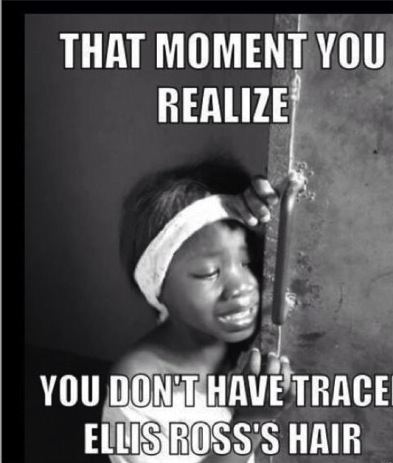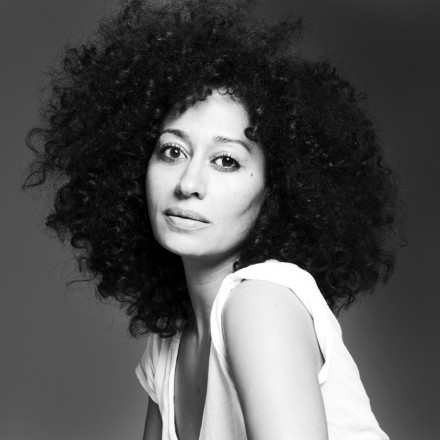By Lurie Daniel Favors of Afro State of Mind
We’ve all seen this image circulating on natural hair group facebook pages, instagram accounts and twitter:
And if you’re like me – one of your first reactions was probably to laugh. To the point of howling. But I have to admit that after I laughed I felt…off. I’ve debated with whether or not to forward or “like” the image.
After all – who doesn’t like a good “natural hair” joke?
But I’ve always decided to keep my laughter at this image personal, quite and only behind my own doors. Why? Because despite the fact that it’s hilarious at first glance, the message it sends is one of the most potentially harmful circulating within the Black community.
The message conveyed by this picture, which features a brown skinned Black girl crying for hair like the lovely Tracee Ellis Ross, is at the heart of many of the issues that prevent Black women from loving the hair they have.
We all know there is a hair type and skin color hierarchy in the Black community. And we’d be lying if we didn’t recognize that instead of transcending this hierarchy in the natural hair movement – many naturals have unconsciously adopted, embraced and even perpetuated this way of thinking.
A Certain “Type” of Natural
Many of us want natural hair – but only if it looks like Sister Tracee’s.
Many of us with kinky hair spend hours of our lives searching for youtube videos of women with looser, “definable” curls and yearn for the day we find a product that will make our nappy hair look more like mixed girl hair.
There is, after all, a reason that some of the highest rated youtube natural hair videos feature multi racial women with hair that could never be described as anything close to kinky or nappy.
There are reasons why natural hair stylists bemoan the fact that many natural heads come to the salon looking for miracles that will transform their kinky, nappy strands into hair that is…neither kinky nor nappy.
We may want to be natural. But some of us only want a certain “type” of natural. This desire was at the heart of my youthful run ins with the Jheri Curl. Le Sigh!
As I’ve noted before:
A lot of girls who grew up believing that they had “bad” hair (or a very tight, coily or kinky curl pattern) spent their early years longing for “good” hair (or hair closer to the texture of Europeans) that could blow in the wind… Many of us grow up wishing we had lighter brown skin – often times regardless of how light or dark brown our actual skin color already was.
I’m as guilty of this as anyone. As I describe in my book,
I have vivid memories of coming home from church on Sundays and my sister and I would put our crinoline slips or stockings on our heads. We tied them on with belts or string so that the soft material could brush against our shoulders the way we imagined straight long hair did. I wanted hair like the White girls had—but I would have settled for hair like my sister’s. Naturally, my sister was also impacted by these messages and despite the fact that relatively speaking, she already had “good” hair, in our childhood games she wanted hers to be straighter too.
We Have the Power to Change This
This is not about pointing fingers. It’s about recognizing that until we change the thoughts that are in our heads it will be very challenging to embrace the hair that is on our heads. It will be difficult to convince our children that they should love the skin they are in and the hair that they wear if so many of us are secretly nursing the desire for hair closer to the kind of hair that grows from our White sisters’ heads.
That’s why I was elated to see this video response to the image from Tracee Ellis Ross where she calls for a “hair love” campaign. Ms. Ross saw this picture and like many of us she laughed and felt flattered—at first.
But as she noted in her video:
At the same time I don’t want you to want my hair…and the reason I don’t want you to want my hair is I’m of the school of love what you got…For me, the reason my hair was such a battle is because I was trying to make it something it wasn’t. I wanted the hair that somebody else had. And because of that I was damaging my hair, trying to beat it into submission, trying to make it something it wasn’t, trying to make it slip into my face unconsciously. I was trying to do all of those things to it and as a result I was ruining and damaging the hair that I was given.
Can the church say “Amen”?
Ms. Ross ends her video by calling for participants in a Hair Love campaign (details on how you can participate below).
See it doesn’t matter how straight, “good” or “mixed” your hair may look. If you are a woman (or man) of African descent you are being targeted with messages that tell us we will never be good enough until we look whiter or have straighter hair. Many of us harbor a little Black girl inside who still fails the doll test. Many of us still buy into a default pattern of thinking that strives to be “just as good as” our White brothers and sisters.
And if you are a Black woman (or man) who wants something better for our kids than what we had then you owe it to yourself, your sisters, your mothers, your aunties, your grandmas, your children, nieces, nephews, husbands, uncles, grandpas and everyone else in your family and community to challenge these beliefs whenever they rear their ugly heads.
So consider this my endorsement of Tracee Ellis Ross’ Hair Love campaign. PLEASE PARTICIPATE!!! All you have to do is go to youtube and upload a video that describes your hair in 5 words or less, and explain why you love it.
It’s that easy. Sometimes we make things more complicated than they have to be. Imagine the love little Black girls and boys may feel when there are thousands of videos on the net describing how awesome Black hair is?
I’ll be discussing this issue more in depth at my book release event on June 30, 2013 (click here for details). Hair and color are so intertwined in our collective experience that I’m looking forward to sharing excerpts of my book that directly address these topics. I hope you can join us!
Here’s the video. Thank you Tracee!


